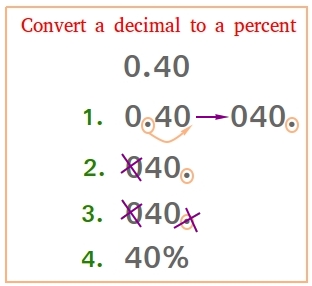Decimal to Percent
Interactive Lesson: Converting Decimal to Percent
Moving the Decimal Point (Practice)
To convert a decimal to a percentage, move the decimal point two places to the right, then add the % symbol!
How to Convert from Decimal to Percent
How to convert a number from decimal to percent is the goal of this lesson. In a nutshell, all you need to do is to move the decimal point two places to the right and adding the percent symbol.

Did you not clearly understand the example in the figure above? Are the steps still confusing? Do you need more examples? Keep reading!
Steps to Follow to Convert a Decimal to a Percent
- Move the decimal point two places to the right.
- Remove unnecessary zeros on the left of the number.
- Remove the decimal point that was moved two places to the right if step 2 gave a whole number. Otherwise, keep the decimal point.
- Add the percent sign or % to the right of the number.
Examples Showing How to Convert a Decimal to a Percent
Example #1:
Change 0.123 to a percent.
Step 1.
Move the decimal point two places to the right. This means that you will place the decimal point between the 2 and the 3.
We get 012.3
Step 2.
Remove any unnecessary zero(s) on the left of the number.
We get 12.3
Step 3.
Remove the decimal point that was moved two places to the right if step 2 gave a whole number. Otherwise, keep the decimal point.
12.3 is not a whole number, so keep decimal point.
Step 4.
Add the percent sign or % to the right of the number.
The answer is 12.3%
Example #2:
Change 0.50 to a percent.
Step 1.
Place the decimal point after the 0.
We get 050.
Step 2.
Remove the unnecessary zero.
We get 50.
Step 3.
Remove the decimal point.
We get 50
Step 4.
Add the percent symbol: %
The answer is 50%
Notice that there is no need to write the decimal point if it occurs at the end of the number.
Notice also that moving the decimal point to the right two places is the same thing as multiplying the number by 100.
Multiplying by 100 is the inverse of dividing by 100 in order to convert to a decimal when the number is given as a percent.
Change 0.0000256 to a percent.
Move the decimal point two places to the right.
We get 000.00256
Remove the unnecessary zero and keep the decimal point.
We get 0.00256
Add the percent symbol: %
The answer is 0.00256%